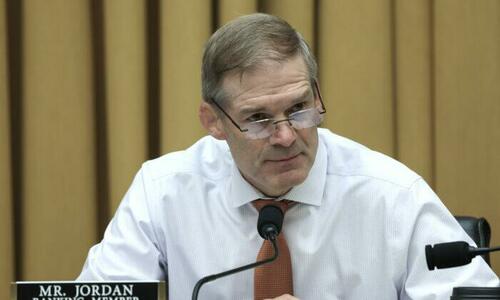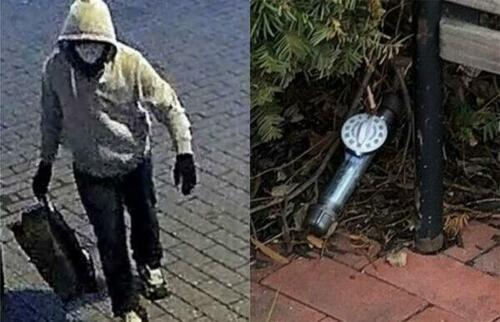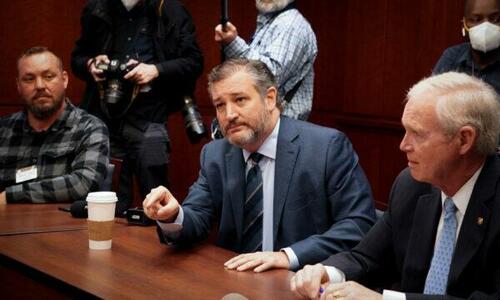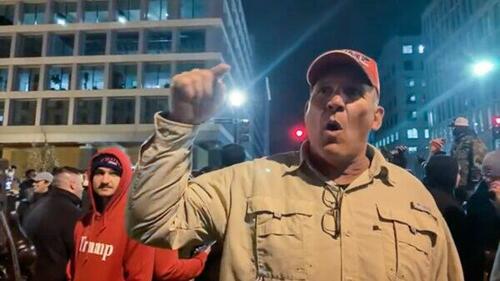by Joseph Lord via The Epoch Times (emphasis ours),
As part of a gargantuan 1,050-page report detailing whistleblower findings from the FBI and Department of Justice (DOJ), Republicans found that the FBI waited over a year to begin a comprehensive investigation into the pipe bombs that were planted in front of both major parties’ headquarters on Jan. 5, 2021.

In the Nov. 5 report, Republicans argued that the FBI and DOJ have undergone “weaponization” during the course of President Joe Biden’s first term in office.
Specifically, the report focuses on the Department of Justice (DOJ) under Attorney General Merrick Garland and the FBI under Director Christopher Wray (pdf).
Garland, Republicans said, has been “a willing participant of the Biden Administration’s weaponization of law enforcement.” The FBI too, Republicans assert, “has abused its law-enforcement authorities for apparently political purposes.”
Republicans listed a series of seemingly-partisan decisions and top-down efforts by Garland’s DOJ to mislead or deceive the American people.
For instance, the bombshell report found that the FBI has been incentivizing and pushing its field agents to classify certain crimes as incidents of domestic violence extremism (“DVEs”) even when the facts do not align with such a classification. Republicans contended that this is part of an effort to bolster Biden and other Democrats’ contested claims that right-wing DVEs are one of the greatest threats Americans face.
The report also noted a bizarre incident in which the FBI went a step further, and actually manufactured a DVE.
The event occurred in Michigan, where several men were arrested for a planned plot to kidnap Gov. Gretchen Whitmer. At their trial, defense attorneys revealed that no less than 12 FBI assets had participated in and pushed the men toward the plot.
Republicans also cited Garland’s controversial Oct. 4, 2021 “school board memo,” in which he offered federal resources and guidance for municipalities seeking to punish parents voicing opposition to their children being taught radically left-wing ideas like critical race and gender theory.
Additionally, Judiciary Republicans cited Garland’s unprecedented authorization of a raid on President Donald Trump’s Mar-a-Lago home. Purportedly, Trump had taken classified documents from the White House that posed a national security threat. It was only after the midterms that the DOJ backtracked, and admitted that, contrary to their earlier allegations, Trump had no documents that posed any national security threat.
A deeper dive into the report reveals that the FBI and DOJ, while actively targeting conservatives, inexplicably dragged their feet in investigating pipe bombs that were planted by an unknown man ahead of the Jan. 6 “Stop the Steal” rally.
Specifically, security footage captured a still-unidentified man planting pipe bombs in front of both the Republican National Committee (RNC) and Democratic National

At one point, then-Vice President-Elect Kamala Harris was even in the DNC building, meaning her life was imminently at risk.
Still, Judiciary Republicans ruled, “The FBI appears to not be aggressively investigating pipe bombs placed by political party headquarters on January 6, 2021, while prioritizing other January 6, 2021-related investigations.”
Specifically, Republicans learned from a whistleblower that it took over one year for the FBI to mount a full-scale investigation into the pipe bombs.
According to the whistleblower, it was not until Feb. 7, 2022—more than a month and a year after the incident—that the Washington Field Office of the FBI asked its national field offices to investigate and try to identify the man.
In that directive, the FBI warned agents that the suspect’s “motive and ideology remain unknown.”
Speaking to The Epoch Times about the snail’s pace of the investigation, Ed Martin, an attorney for some Jan. 6 defendants, ruled “the judgment of the Department of Justice is clearly biased against certain types of people and certain types of conduct.”
“It appears that the executive branch, the law enforcement branch, has been operating to facilitate a political vision of the article one branch,” Martin said later.
He explained: “The Pelosi select committee [the House January 6 Committee] had a vision of what they wanted to highlight. The conduct of the executive branch, the law enforcement branch has not been to pursue truth and safety. It’s been to pursue the political agenda that’s been driven hand in glove with the select committee.”
Martin, who used to work with the RNC, said that he was pleased that Republicans were giving the issue attention but said that “what we need now is to get to the bottom of what happened.”
He added, “We need to know who said pipe bombs against the American leadership, right?”
“We are living with a bomber, who successfully planted bombs—didn’t go off, thankfully—and who has never been caught,” Martin emphasized. “Shouldn’t that be a worry?”
The FBI did not return a request for comment.
Possible FBI Involvement
The FBI’s slowness in investigating the pipe bombs comes amid a backdrop of suspicion that the FBI played a role in the events of Jan. 6.
Suspicion that the FBI was involved in the events of that day only ramped up after Jill Sanborn, the executive assistant director for the National Security Branch of the FBI, refused to disavow agency involvement at the rally.
During a Jan. 11, 2022, Senate hearing, Sen. Ted Cruz (R-Texas) questioned Sanborn about potential FBI involvement. These questions were met with deflection by Sanborn, who avoided giving a definitive answer to the yes or no questions posed by Cruz.

“How many FBI agents or confidential informants actively participated in the events of Jan. 6?” Cruz asked.
“So I’m sure you can appreciate that I can’t go into the specifics of sources and methods,” Sanborn replied.
“Did any FBI agents or confidential informants actively participate in the events of Jan. 6, yes or no?” Cruz asked.
“Sir, I can’t—I can’t answer that,” Sanborn said.
“Did any FBI agents or confidential informants commit crimes of violence on Jan. 6?” Cruz asked.
“I can’t answer that, sir,” Sanborn replied.
“Did any FBI agents or FBI informants actively encourage and incite crimes of violence on Jan. 6?”
“Sir, I can’t answer that.”
Questions about the FBI’s involvement have also been raised by the mystery of Ray Epps, a man who was caught on video on Jan. 5, 2021, encouraging protestors to go into the Capitol building the next day.
“Tomorrow, we need to get to into the Capitol,” Epps was caught saying. “Into the Capitol,” he reiterated.
Epps was immediately shouted down by cries of “Fed! Fed! Fed!,” common internet slang describing someone who works with federal law enforcement, particularly the FBI.

The next day, additional video caught Epps whispering into the ear of a protestor, who proceeded to begin tearing down one of the first barricades around the Capitol.
Initially, Epps was identified as the FBI’s number 16 most wanted person for their involvement in the events of Jan. 6, with the agency offering a cash reward for information that led to his arrest. But Epps was later mysteriously removed from the list—a fact that further attracted suspicion amid the largest manhunt in the history of the Department of Justice (DOJ), which saw dozens of nonviolent offenders who entered the Capitol rounded up.
“Ms. Sanborn, who is Ray Epps?” Cruz asked during the Jan. 11 hearing.
“I’m aware of the individual sir,” Sanborn said. “I don’t have the specific background on him.”
“Well, there are a lot of people who are understandably concerned about this,” Cruz said before describing the videos captured showing Epps attempting to incite violence.
“On the night of Jan. 5, 2021, Epps wandered around the crowd that had gathered, and there’s video out there of him chanting ‘Tomorrow, we need to get into the Capitol, into the Capitol.’
“This was strange behavior, so strange that the crowd began chanting, ‘Fed, fed, fed, fed, fed, fed.’
“Ms. Sanborn, was Ray Epps a fed?”
“Sir, I cannot answer that question,” Sanborn replied.
Cruz then cited the other incident caught on tape involving Epps.
“The next day, on Jan. 6, Mr. Epps was seen whispering to a person and five seconds later—five seconds after he’s whispering to a person—that same person begins to forcibly tear down the barricades,” Cruz said. “Did Mr. Epps urge them to tear down the barricades?”
“Sir, similar to the other answers, I cannot answer that,” Sanborn repeated.
Cruz noted that for a brief period, Epps was given a relatively high spot on the FBI’s wanted list before being “magically” removed.
The wanted ad “was posted and then sometime later, magically, Mr. Epps disappeared from the public posting,” Cruz said.
The role played by the FBI, as well as possible ties between Epps and federal law enforcement, are one of a plethora of questions left unanswered and unaddressed by the Jan. 6 panel.
No comments:
Post a Comment
Note: Only a member of this blog may post a comment.